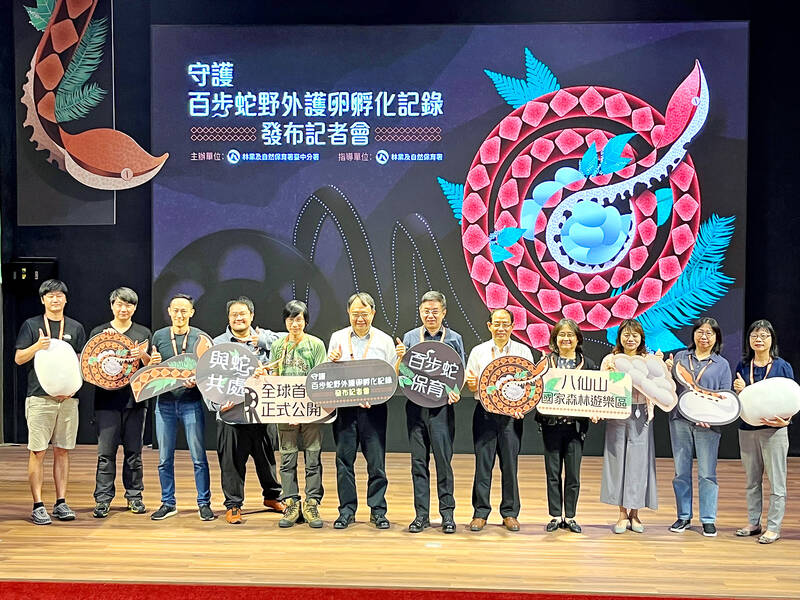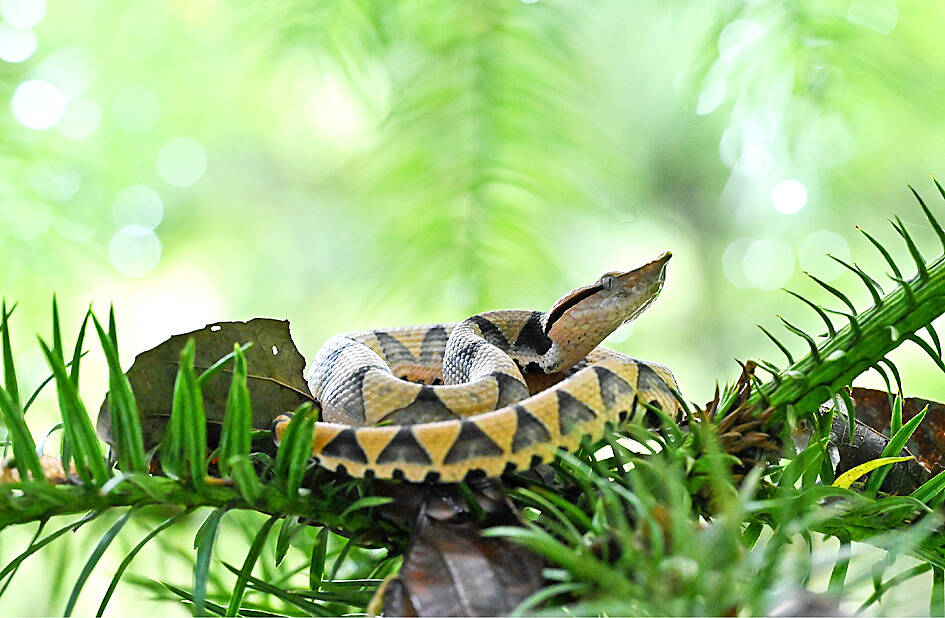A hundred-pace snake was filmed in Taiwan caring for its young, marking a first for the global snake research community, the Forestry and Nature Conservation Agency told a news conference in Taipei yesterday.
The agency and the Formosan Wild Sound Conservation Science Center monitored a nest of the venomous pit viper species after an environment educator in July last year spotted the female snake on Basianshan (八仙山) in Taichung’s Heping District (和平), the agency said.
Deinagkistrodon are an endangered species that live in mountainous areas in Taiwan, in addition to parts of China and Vietnam. The species’ existence is threatened by habitat loss.

Photo: CNA
The research provided valuable insight into parts of the hundred-pacer’s life cycle that had only been speculated on until now, said Lin Hua-ching (林華慶), director of the agency’s Taichung branch.
Using motion-activated infrared cameras and thermal imagers, researchers saw that the mother viper left the nest for brief periods, presumably to facilitate incubation by warming itself, Lin said.
Scientists also attached tiny passive radar transponders to the snakelets to track their movements, he said, adding that the devices are commonly used by hikers to signal their location to emergency rescue teams.

Photo courtesy of the Forestry and Nature Conservation Agency
The research showed that the snakelets stayed in the nest for two weeks after hatching, he said.
Lin was the first person to successfully breed hundred-pacers in captivity in Taiwan.
Being able to witness a female viper guarding its young was “a pure stroke of luck,” he said.
Coupled with previous research, the study suggested that female hundred-pacers stay with their nest for eight months without feeding, which might result in their death, Lin said.
The survival rate of snakelets remains a mystery, he added.
Agency official Lin Jhan-wei (林展蔚), a researcher at the National Museum of Natural Science, said that the snakelets were tracked until they shed their skin 30 days after hatching.
The young snakes slowly expanded their sphere of activity, initially dwelling in the rocky crevices and foliage near the cave where they nested, she said.
She added that she was “too excited to sleep” throughout the research period, as she “would never see 20 wild hundred-pacers hatch” in her life again.
The team expects to share the study at the 10th World Congress of Herpetology in Malaysia in August and publish a full paper next year, Lin Jhan-wei said.
The agency said that hundred-pacers do not attack humans unless cornered, so the public should leave them alone.
Antivenom is available at every major hospital in Taiwan, it said.
Efforts to regrow the hundred-pacer population have gained momentum since Taiwanese gave up eating snakes, but a full recovery is still a long way off, it added.

Prosecutors in New Taipei City yesterday indicted 31 individuals affiliated with the Chinese Nationalist Party (KMT) for allegedly forging thousands of signatures in recall campaigns targeting three Democratic Progressive Party (DPP) lawmakers. The indictments stem from investigations launched earlier this year after DPP lawmakers Su Chiao-hui (蘇巧慧) and Lee Kuen-cheng (李坤城) filed criminal complaints accusing campaign organizers of submitting false signatures in recall petitions against them. According to the New Taipei District Prosecutors Office, a total of 2,566 forged recall proposal forms in the initial proposer petition were found during the probe. Among those

ECHOVIRUS 11: The rate of enterovirus infections in northern Taiwan increased last week, with a four-year-old girl developing acute flaccid paralysis, the CDC said Two imported cases of chikungunya fever were reported last week, raising the total this year to 13 cases — the most for the same period in 18 years, the Centers for Disease Control (CDC) said yesterday. The two cases were a Taiwanese and a foreign national who both arrived from Indonesia, CDC Epidemic Intelligence Center Deputy Director Lee Chia-lin (李佳琳) said. The 13 cases reported this year are the most for the same period since chikungunya was added to the list of notifiable communicable diseases in October 2007, she said, adding that all the cases this year were imported, including 11 from

China might accelerate its strategic actions toward Taiwan, the South China Sea and across the first island chain, after the US officially entered a military conflict with Iran, as Beijing would perceive Washington as incapable of fighting a two-front war, a military expert said yesterday. The US’ ongoing conflict with Iran is not merely an act of retaliation or a “delaying tactic,” but a strategic military campaign aimed at dismantling Tehran’s nuclear capabilities and reshaping the regional order in the Middle East, said National Defense University distinguished adjunct lecturer Holmes Liao (廖宏祥), former McDonnell Douglas Aerospace representative in Taiwan. If

The Mainland Affairs Council (MAC) today condemned the Chinese Communist Party (CCP) after the Czech officials confirmed that Chinese agents had surveilled Vice President Hsiao Bi-khim (蕭美琴) during her visit to Prague in March last year. Czech Military Intelligence director Petr Bartovsky yesterday said that Chinese operatives had attempted to create the conditions to carry out a demonstrative incident involving Hsiao, going as far as to plan a collision with her car. Hsiao was vice president-elect at the time. The MAC said that it has requested an explanation and demanded a public apology from Beijing. The CCP has repeatedly ignored the desires